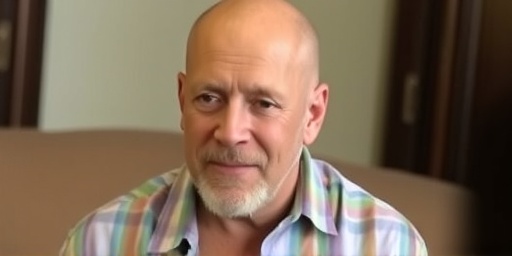In a raw and emotional moment that has left fans worldwide heartbroken, Rumer Willis, the eldest daughter of Hollywood icon Bruce Willis, shared a deeply personal update on her father’s deteriorating health. Fighting back tears during a recent interview, Rumer revealed that due to his advancing frontotemporal dementia, the Die Hard star often fails to recognize her, marking a poignant chapter in the family’s ongoing battle with the degenerative brain disorder. This candid disclosure not only highlights the human side of celebrity health challenges but also underscores the Willis family’s commitment to raising awareness about dementia in the glitzy world of Hollywood.
- Rumer’s Tearful Interview Exposes the Daily Heartache of Dementia Care
- Frontotemporal Dementia Unpacked: Why It’s Stealing Bruce Willis’s Spark
- The Willis Family’s United Front Against a Silent Thief
- Hollywood Grapples with Rising Celebrity Dementia Cases and Awareness Drives
- Hope on the Horizon: Research Breakthroughs and Family’s Path Forward
The 35-year-old actress and singer, known for her roles in films like Sorority Row and her appearances on Dancing with the Stars, opened up about the painful realities of caring for a loved one with this relentless condition. ‘It’s heartbreaking to see the man who raised me, who was always so strong and vibrant, now struggling with these moments,’ Rumer said, her voice cracking with emotion. Bruce Willis, 68, was first diagnosed with aphasia in March 2022, a communication disorder that later progressed to frontotemporal dementia, a form that affects behavior, personality, and language skills. The family announced the update in February 2023, emphasizing that Bruce would step away from acting to focus on his health, requiring round-the-clock care from his loved ones.
Rumer’s Tearful Interview Exposes the Daily Heartache of Dementia Care
Rumer Willis’s recent appearance on the podcast ‘Informal’ with hosts Lena Dunham and Jenni Konner became a platform for unfiltered vulnerability. As she discussed her father’s condition, Rumer described instances where Bruce’s recognition faltered, a symptom all too common in frontotemporal dementia patients. ‘There are days when he looks at me, and I can see the confusion in his eyes. It’s like losing a piece of him every time,’ she shared, wiping away tears. This isn’t the first time Rumer has spoken publicly about her father’s health; in previous statements, she has praised the family’s united front, including her mother Demi Moore and siblings Scout, Tallulah, and younger sisters Mabel and Evelyn from Bruce’s marriage to Emma Heming Willis.
The emotional weight of these revelations resonates deeply in Hollywood, where celebrities often shield personal struggles from the public eye. Rumer’s willingness to share stems from a deliberate choice to humanize dementia, a disease affecting over 55 million people globally according to the World Health Organization. In the U.S. alone, the Alzheimer’s Association reports that nearly 7 million individuals live with Alzheimer’s and related dementias, with frontotemporal dementia accounting for 10-20% of those under 65—a group that includes many high-profile figures like Bruce Willis.
During the interview, Rumer detailed the practical challenges of caregiving. ‘Dad needs constant supervision now; we have a team of professionals, but it’s the emotional toll that’s hardest,’ she explained. She recounted a recent family gathering where Bruce’s once-commanding presence was subdued, prompting reflections on his legendary career. From action-packed blockbusters to heartfelt comedies, Bruce’s filmography spans over 100 movies, grossing billions at the box office. Yet, as Rumer noted, ‘His legacy isn’t just the roles he played; it’s the father he was to us.’
To illustrate the progression, Rumer shared that early signs included subtle language slips during film sets, which fans mistook for method acting quirks. By 2022, these evolved into more pronounced behavioral changes, leading to his retirement announcement via Instagram, co-signed by the family. ‘We wanted to protect his dignity while being honest,’ Rumer said. Her words echo the experiences of countless families navigating celebrity health under public scrutiny, where privacy battles paparazzi intrusion.
Frontotemporal Dementia Unpacked: Why It’s Stealing Bruce Willis’s Spark
Frontotemporal dementia (FTD), the specific form afflicting Bruce Willis, targets the frontal and temporal lobes of the brain, regions responsible for decision-making, social behavior, and language. Unlike Alzheimer’s, which primarily affects memory, FTD often strikes younger individuals, with an average onset age of 45 to 64. The Association for Frontotemporal Degeneration (AFTD) estimates that 60,000 Americans live with FTD, yet awareness lags behind other dementias due to its rarity and complexity.
Symptoms vary widely but commonly include personality shifts, impulsivity, and, as Rumer described, recognition deficits known as prosopagnosia in advanced stages. For Bruce, a man synonymous with tough-guy personas in films like Pulp Fiction and The Sixth Sense, these changes represent a stark contrast. Medical experts, such as Dr. Bradley Boeve from the Mayo Clinic, explain that FTD progresses relentlessly, with no cure available. ‘Treatments focus on symptom management—medications for mood stabilization, speech therapy, and supportive care,’ Boeve notes in a recent journal article.
Statistics paint a grim picture: Life expectancy post-diagnosis ranges from 2 to 10 years, depending on subtype and early intervention. In Bruce’s case, the family’s proactive approach—implementing home modifications, hiring neurologists, and joining support groups—has extended his quality of life. Rumer emphasized the genetic component, as FTD can be hereditary in 30-50% of cases, prompting her and her siblings to pursue genetic counseling. ‘We’re educating ourselves to stay ahead,’ she said.
Broader context reveals FTD’s underfunding; the National Institutes of Health allocates only a fraction of dementia research budgets to it compared to Alzheimer’s. This disparity hits Hollywood hard, with past cases like Robin Williams, whose Lewy body dementia shared FTD traits, highlighting the entertainment industry’s vulnerability. Rumer’s update serves as a call to action, urging donations to organizations like AFTD, which has seen a 20% funding spike since Bruce’s diagnosis due to celebrity involvement.
Personal anecdotes from Rumer add depth: She recalled childhood memories of Bruce on set, teaching her improv games that now feel distant. ‘He’d say, “Yippee-ki-yay, kiddo,” and we’d laugh. Those echoes keep us going.’ Such stories humanize the science, blending dementia‘s clinical facts with emotional narratives that captivate readers.
The Willis Family’s United Front Against a Silent Thief
Behind the glamour of Bruce Willis‘s career lies a blended family that has weathered storms with resilience. Rumer, born in 1988 to Bruce and Demi Moore, grew up in the spotlight, navigating her parents’ high-profile 2000 divorce. Yet, the co-parenting dynamic remained strong, especially evident in their collective response to Bruce’s health crisis. Demi Moore has been vocal, posting family photos on social media with captions like ‘Grateful for these moments,’ while Emma Heming Willis advocates through her platform, sharing wellness tips for caregivers.
The sisters—Rumer, Scout (32), and Tallulah (30)—have formed a tight-knit support system, often seen together at events. Scout, an artist, channeled her grief into paintings inspired by Bruce’s films, while Tallulah, a model, uses her influence for mental health awareness. ‘We’re all in this together; Dad’s fight is our fight,’ Rumer affirmed. The younger daughters, Mabel (11) and Evelyn (9), are shielded from media but included in family therapies designed for children facing parental illness.
Family statements have been strategic: The 2022 aphasia reveal was a joint effort to curb rumors, followed by the 2023 FTD update. ‘We chose transparency to foster understanding,’ Emma wrote in a blog post. This approach contrasts with other celebrity health stories, like Michael J. Fox’s Parkinson’s journey, which also boosted awareness. The Willises have partnered with the Cleveland Clinic for specialized care, incorporating music therapy—Bruce’s love for blues harmonica aids cognitive stimulation.
Challenges abound: Balancing careers with caregiving strains resources. Rumer paused her music projects to assist, echoing trends where 53 million Americans provide unpaid dementia care annually, per AARP. Financially, Hollywood stars fare better, but emotional burnout is universal. Rumer recommended respite programs, noting, ‘Self-care isn’t selfish; it’s survival.’
Public support has poured in, with tributes from co-stars like Bruce’s Die Hard director John McTiernan, who said, ‘He’s a fighter on and off screen.’ Fan campaigns, including #PrayForBruce, trend on social media, amplifying the family’s message.
Hollywood Grapples with Rising Celebrity Dementia Cases and Awareness Drives
Bruce Willis‘s diagnosis has ignited conversations in Hollywood about aging and health in an industry that idolizes youth. From Rita Hayworth’s Alzheimer’s in the 1980s to more recent figures like Glen Campbell, dementia has quietly afflicted stars, often revealed posthumously. Today, with longer lifespans, cases are rising; the Alzheimer’s Association predicts a doubling of U.S. dementia patients by 2050.
The entertainment sector responds variably: Studios like Warner Bros., which produced many Bruce films, offer on-set health screenings, but stigma persists. Rumer’s openness challenges this, aligning with movements like #MeToo’s vulnerability ethos. Experts like Dr. Lisa Mosconi from Weill Cornell Medicine stress early detection: ‘Brain scans and cognitive tests can delay progression if caught soon.’
Awareness campaigns flourish: The Willis family endorses ‘World FTD Awareness Week,’ sharing resources via their website. Celebrities including Jamie Foxx and Meryl Streep have voiced support, with Foxx tweeting, ‘Strength to the Willises—let’s fund the cure.’ Philanthropy surges; Bruce’s involvement in the Make-A-Wish Foundation pre-diagnosis now inspires dementia charities.
Industry implications loom: Reshoots for films like 2022’s A Day to Die cost millions after Bruce’s exit, prompting insurance reforms. Agents advocate for ‘health clauses’ in contracts, protecting actors’ legacies. Rumer envisions a Hollywood where celebrity health discussions normalize seeking help, reducing isolation for stars like Bruce.
Hope on the Horizon: Research Breakthroughs and Family’s Path Forward
As Rumer Willis and her family navigate this uncharted territory, glimmers of hope emerge from dementia research. Clinical trials for anti-tau therapies, targeting FTD’s protein buildup, show promise; a 2023 study in The Lancet reported 15% symptom stabilization in early participants. Gene therapies, like those from UniQure, aim at hereditary cases, potentially benefiting the Willises.
The family plans continued advocacy: Rumer is scripting a documentary on FTD, interviewing experts and patients. ‘We want to turn pain into purpose,’ she said. Collaborations with the Michael J. Fox Foundation explore cross-dementia strategies, while Emma’s book on caregiving, slated for 2024, offers practical advice.
Looking ahead, the Willises emphasize joy amid adversity—family movie nights replaying Bruce’s classics, fostering connections. Rumer urges public action: ‘Donate, volunteer, talk about it. For Dad and everyone affected by dementia.’ With Bruce Willis‘s indomitable spirit, their journey inspires a collective push toward better treatments, ensuring his light endures beyond the fog.








